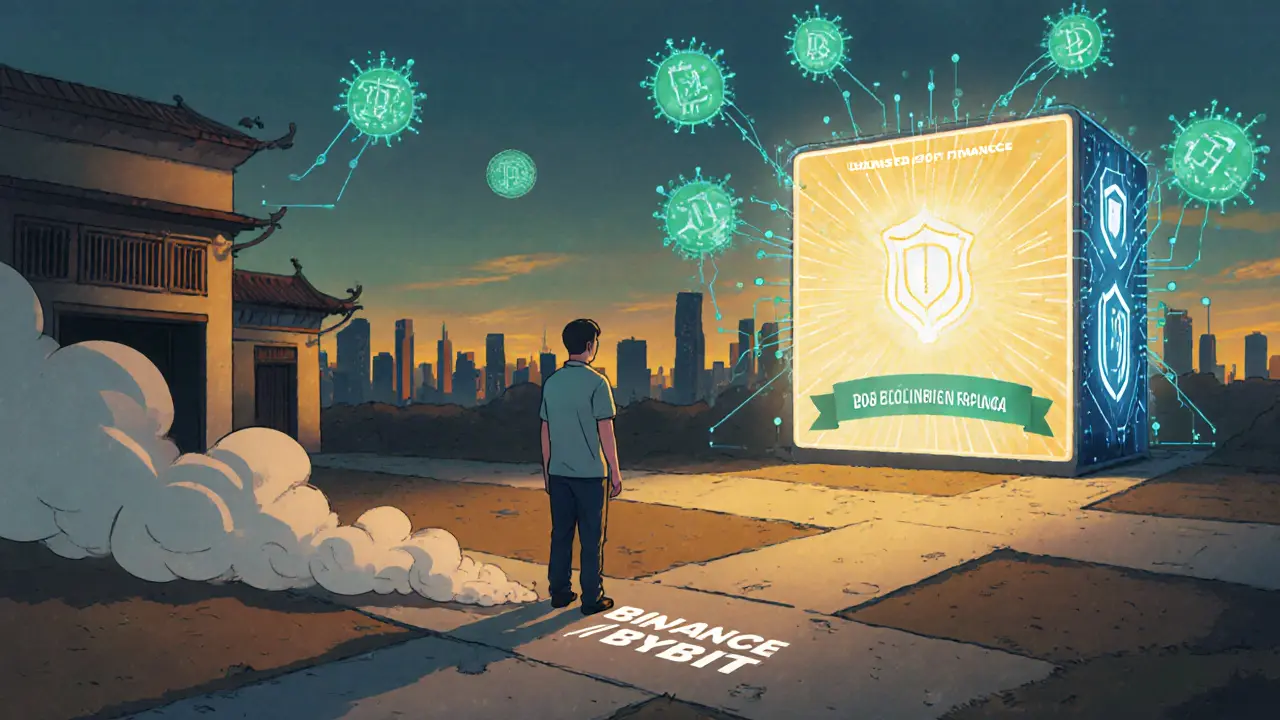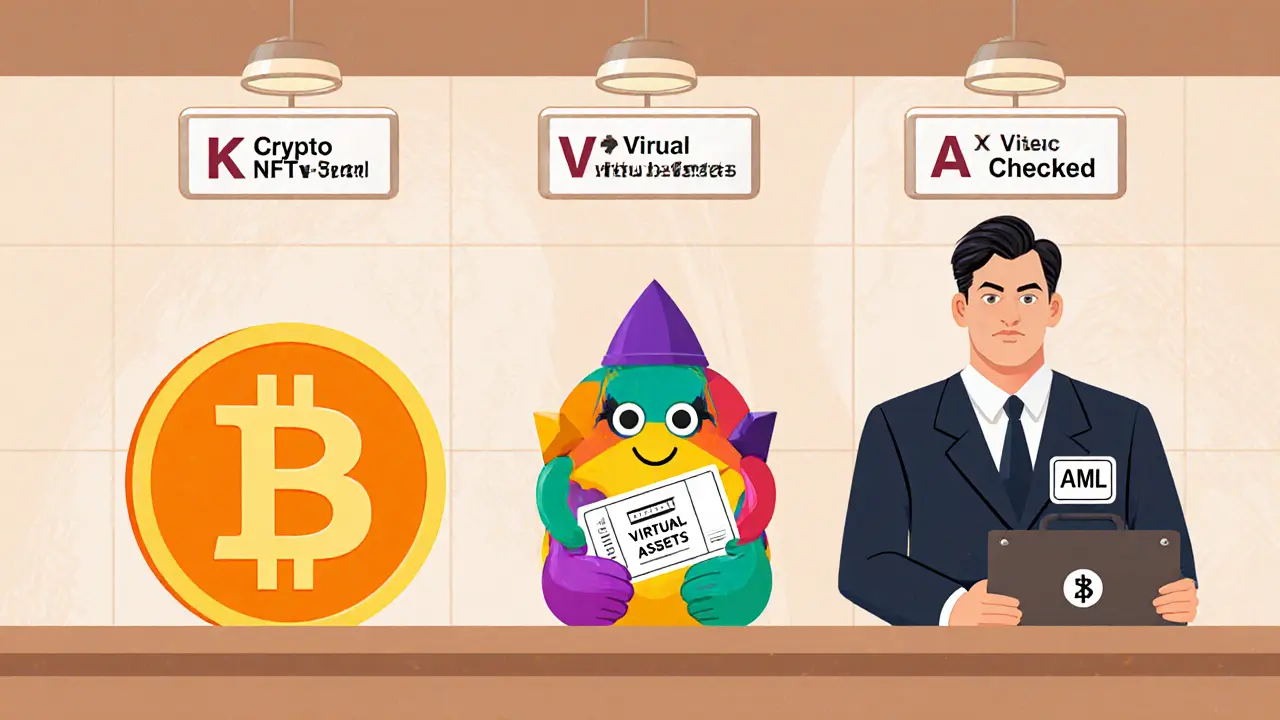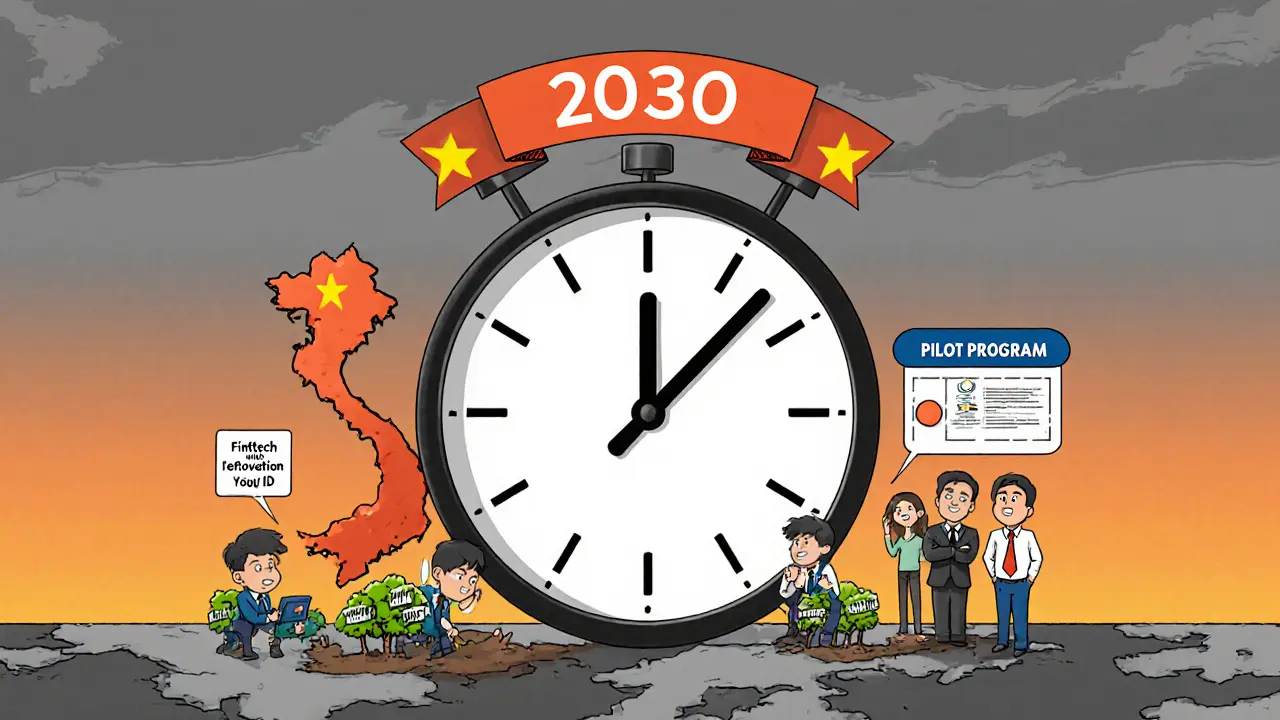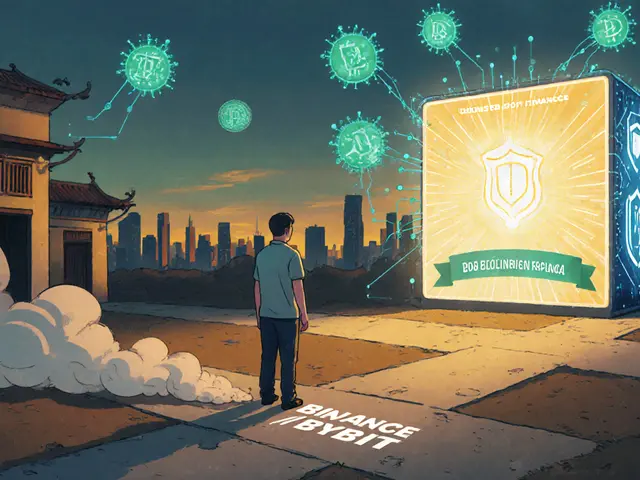Vietnam's Pilot Crypto Program 2025-2030: What You Need to Know

Vietnam just changed everything about crypto
For years, Vietnam’s stance on cryptocurrency was clear: no payments, no banking support, no official recognition. Traders used offshore exchanges, dodged restrictions, and operated in a legal gray zone. But on September 9, 2025, that changed. Vietnam launched the world’s first government-backed, five-year pilot program for cryptocurrency - running until 2030. This isn’t a trial run. It’s a full legal reset.
The new rules don’t just allow crypto. They define it. Under Law No. 71/2025/QH15 and Resolution 05/2025/NQ-CP, virtual assets are now recognized as legitimate property under Vietnam’s Civil Code. That’s huge. For the first time ever, a country has formally written crypto into its civil law - not as a currency, not as a commodity, but as a digital asset with legal standing.
What’s actually allowed now?
You can own crypto. You can trade it. You can invest in it. But you can’t use it to buy coffee or pay your rent. The State Bank of Vietnam still bans crypto as a payment method. Banks can’t process crypto transactions. That hasn’t changed.
What’s new is the requirement: all trading, issuing, and service provision must go through licensed providers. The Ministry of Finance is the gatekeeper. No license? No business. The first licensed platform is expected to launch by March 2026. After that, domestic users have six months to move all their activity onto these approved platforms. After the deadline, using unlicensed exchanges is illegal.
There are three categories of digital assets under the new system:
- Virtual assets: any digital item used for exchange or investment, as long as it’s not a security or digital currency.
- Crypto assets: a subset that uses encryption or digital tech to authenticate ownership and transfers - this is Bitcoin, Ethereum, and similar tokens.
- Other virtual assets: everything else that doesn’t fit the first two - think NFTs, utility tokens, or in-game items if they’re traded for value.
So if you’re holding Bitcoin in a wallet, you’re fine. But if you’re trading it on Binance or Bybit without going through a Vietnamese-licensed platform after March 2026, you’re breaking the law.
Why now? And why Vietnam?
Vietnam has one of the most active crypto markets in Southeast Asia. Daily trading volume hits over $600 million, according to VIR, even with no legal framework. That’s more than Thailand and Singapore combined in some months. The government couldn’t ignore it. People were already using crypto. The question was: do you try to stop it, or do you control it?
Vietnam chose control. This move isn’t about freedom. It’s about oversight. The government wants to track capital flows, prevent money laundering, and keep financial stability. That’s why the rules are strict: mandatory KYC, AML checks, cybersecurity standards, and reporting to authorities. Foreign investors can participate, but they must play by Vietnam’s rules.
Compare this to China, where crypto is banned outright. Or India, where trading is taxed at 30% but still lacks clear licensing. Vietnam’s approach is more like the EU’s MiCA law - but tighter. And unlike the EU, Vietnam’s pilot has a hard deadline: September 8, 2030. After that, the government will decide whether to make it permanent, expand it, or shut it down.

What’s still unclear?
There are big gaps. Mining? No official word yet. Is it legal? Illegal? Taxed? Nobody knows. The Ministry of Finance says guidance is coming, but as of October 2025, there’s still no clarity. Tax rules are also in flux. Right now, crypto gains are being taxed under securities rules - but that’s temporary. A dedicated crypto tax code is expected before 2026.
Penalties for violations aren’t fully defined either. Will you get fined? Have your assets seized? Face criminal charges? The law says violators can be subject to administrative sanctions or criminal liability - but it doesn’t say when one starts and the other ends. That leaves room for confusion - and fear.
Most local traders are struggling with the transition. Many don’t know which platforms will be licensed. The official documentation is mostly in Vietnamese. English translations are sparse. Legal advice is expensive. Small investors feel left behind.
Who wins? Who loses?
Big exchanges like Binance, Kraken, and Coinbase don’t stand to gain much. They can’t operate directly in Vietnam unless they get licensed - and the bar is high. Local startups and financial tech firms are the real beneficiaries. If you’re building a crypto wallet, exchange, or custody service in Hanoi or Ho Chi Minh City, this is your moment. The market is wide open for licensed players.
But small traders? They’re caught in the middle. If you’ve been using P2P platforms or overseas apps, you’ll need to switch. That means learning new interfaces, dealing with slower withdrawals, and possibly higher fees. Some users are already complaining about the lack of transparency in the licensing process. Others worry the government will favor big banks and established firms - leaving smaller players out.
And what about the 20 million Vietnamese under 30 who grew up trading crypto? They’re not going away. They just need to adapt. Community groups on Facebook and Reddit are already sharing tips on how to apply for licenses, what documents to prepare, and which platforms to watch.

What happens after 2030?
No one knows for sure. But the signs point to permanence. Vietnam’s leadership sees this as a chance to become a regional tech hub. If the pilot runs smoothly - low fraud, high compliance, stable markets - expect the program to be made permanent. If there’s chaos, they’ll tighten the rules or shut it down.
One thing’s certain: Vietnam is betting big on digital assets. This isn’t a side project. It’s part of their national digital economy strategy. The government is already linking crypto regulation to broader goals like fintech innovation, digital ID systems, and blockchain-based public services.
By 2030, Vietnam could be the model for other developing nations trying to balance innovation with control. Or it could become a cautionary tale about overregulation. Right now, the world is watching.
What should you do if you’re in Vietnam?
If you’re holding crypto, don’t panic. But don’t ignore it either.
- Keep your assets in a personal wallet - not on an unlicensed exchange.
- Watch for official announcements from the Ministry of Finance about licensed providers. They’ll publish a list.
- Don’t trade on foreign platforms after the six-month window opens - it’s risky.
- Start learning the compliance requirements: KYC, AML, reporting. You’ll need them.
- Consult a local legal advisor if you’re running a business or trading at scale.
This isn’t the end of crypto in Vietnam. It’s the beginning of a new chapter - one where the state holds the pen.
Is cryptocurrency legal in Vietnam in 2025?
Yes, but only under strict conditions. Since September 9, 2025, Vietnam has allowed cryptocurrency ownership, trading, and investment through government-licensed service providers. However, using crypto as payment is still banned, and financial institutions cannot process crypto transactions. The full legal framework takes effect on January 1, 2026.
Can I still use Binance or Coinbase in Vietnam?
You can access them technically, but after the first licensed Vietnamese provider launches (expected by March 2026), you’ll have six months to move your trading to a licensed platform. After that, using foreign exchanges for domestic trading will be illegal. Your funds aren’t automatically frozen, but you’ll be operating outside the law and could face penalties.
Is crypto mining legal in Vietnam?
It’s unclear. As of October 2025, there’s no official guidance on mining. The government hasn’t banned it, but it hasn’t legalized it either. Mining operations are in a gray zone. Expect official rules to be released before the end of 2025 or early 2026. Until then, proceed with caution.
How will crypto be taxed in Vietnam?
Currently, crypto gains are taxed under existing securities tax rules. A dedicated crypto tax framework is under development and expected before January 1, 2026. Until then, traders should assume capital gains will be taxed similarly to stocks or bonds. The Ministry of Finance will finalize rates and reporting requirements soon.
What happens if I don’t switch to a licensed platform?
You could face administrative fines or, in serious cases, criminal liability. The exact penalties aren’t fully defined yet, but violations of the new law can lead to asset freezes, account closures, or even prosecution for money laundering or tax evasion. The government is prioritizing compliance - especially for businesses and frequent traders.
Will this program be extended beyond 2030?
It’s likely, but not guaranteed. The program is a five-year pilot ending September 8, 2030. The government will evaluate its success based on compliance rates, market stability, fraud levels, and economic impact. If it works well, Vietnam will probably make the framework permanent. If there are major issues, they may tighten rules or shut it down.
Can foreigners invest in Vietnam’s crypto market?
Yes, but only through licensed Vietnamese platforms. Foreign investors can buy, sell, and hold crypto assets in Vietnam, but they must comply with the same rules as locals: KYC, AML, and reporting. You cannot operate a crypto business in Vietnam without a local license. Offshore trading accounts are allowed, but domestic transactions must go through approved providers.

Lawrence rajini
This is actually huge 😍 Vietnam just turned crypto from underground hustle to legit asset class. No more shady P2P drama. Time to get licensed or get left behind. 🚀
Clarice Coelho Marlière Arruda
so wait… mining is still a maybe? like are we just supposed to guess or what?? 😅
Jasmine Neo
Typical socialist crypto control. They think they can tax and regulate their way into innovation. This is just state surveillance with blockchain glitter. 🤡
William P. Barrett
It’s fascinating how Vietnam chose not to ban, not to embrace, but to contain. They’re not trying to lead the future - they’re trying to manage its chaos. There’s wisdom in that. Not every revolution needs to be loud to be real.
Cory Munoz
I feel for the small traders. Learning all this compliance stuff is overwhelming if you don’t have a finance background. Hope the government rolls out simple guides in Vietnamese. Maybe even video tutorials?
Olav Hans-Ols
Honestly? This could be the most smart move any developing country has made in crypto so far. Not too loose, not too tight. Just right. Vietnam’s playing 4D chess while everyone else is stuck in checkers.
Kevin Johnston
Licensed platforms by March? I’m already checking the list daily 🤞
Dr. Monica Ellis-Blied
The legal framework is commendable, yet insufficiently detailed. Without explicit definitions of 'serious violation' and 'administrative sanction,' enforcement will be arbitrary and inconsistent. This creates regulatory uncertainty - the antithesis of financial stability.
Saurav Deshpande
They’re using this to track everyone. Next thing you know, your wallet address gets linked to your national ID. This isn’t regulation - it’s a digital leash. The state wants to own your money.
Sheetal Tolambe
I’m from India and honestly, this gives me hope. We’re stuck in this weird tax limbo. Vietnam shows you can build something structured without crushing innovation. Maybe we can learn from them?
Paul Lyman
if you’re not using a licensed platform after 2026 you’re basically asking to get fined or worse. just do it. no one cares if you’re mad about it
gurmukh bhambra
They say 'control' but what they really mean is 'collect data.' You think they don’t know every transaction you make? They’re building a financial surveillance state. This isn’t progress - it’s control with a smile.
Matt Zara
Look, I get the fear. But if you’ve been trading crypto in Vietnam for years, this is the best thing that could’ve happened. No more hiding. No more scams. Just a clear path. Yeah, it’s bureaucratic. But at least now you know where the line is.
Derajanique Mckinney
sooo… can i still use binance? or is that like… illegal now? 😬
Allison Andrews
The real test isn’t whether people comply. It’s whether the licensed platforms can handle the volume without collapsing. If the first one crashes under load, the whole system loses credibility before it even begins.
Lena Novikova
You think this is about control? Nah. It’s about who gets the licenses. Big banks and their friends. The little guy gets stuck paying fees to a government-approved middleman while the real winners are the ones with connections.
Sunny Kashyap
Vietnam thinks it’s smart but they’re just copying the EU. We’ve seen this movie. It ends with more taxes and less freedom. Why can’t they just let people trade?
Rosanna Gulisano
If you’re mining you’re already breaking the law. Just admit it. The government will come for you eventually.
Brian Collett
I’ve been holding BTC since 2021 in a cold wallet. I’m not touching any exchange until I see the official list. Better safe than sorry.
Frech Patz
The distinction between virtual assets, crypto assets, and other virtual assets is legally significant. However, the absence of a clear definition for 'used for exchange or investment' creates ambiguity in classification. This may lead to inconsistent enforcement across jurisdictions.
MICHELLE SANTOYO
They say it’s a pilot but everyone knows it’s permanent. They just need to pretend they’re being careful so they can blame the people later when it fails. Classic. This is how dictatorships start - with compliance forms.
james mason
Let’s be honest - this is just another way for the elite to profit. The real crypto pioneers? They’ll be pushed out. The licensed platforms? Owned by state-connected conglomerates. You think you’re getting freedom? You’re just paying rent to the new landlords.
Jean Manel
This entire system is a disaster waiting to happen. KYC on every transaction? No mining clarity? Tax rules changing monthly? This isn’t innovation - it’s regulatory theater. Vietnam is creating a compliance nightmare for everyone who isn’t a corporation.
Herbert Ruiz
The law says 'administrative sanctions or criminal liability' - but doesn’t define thresholds. That’s not a rule. That’s a weapon.